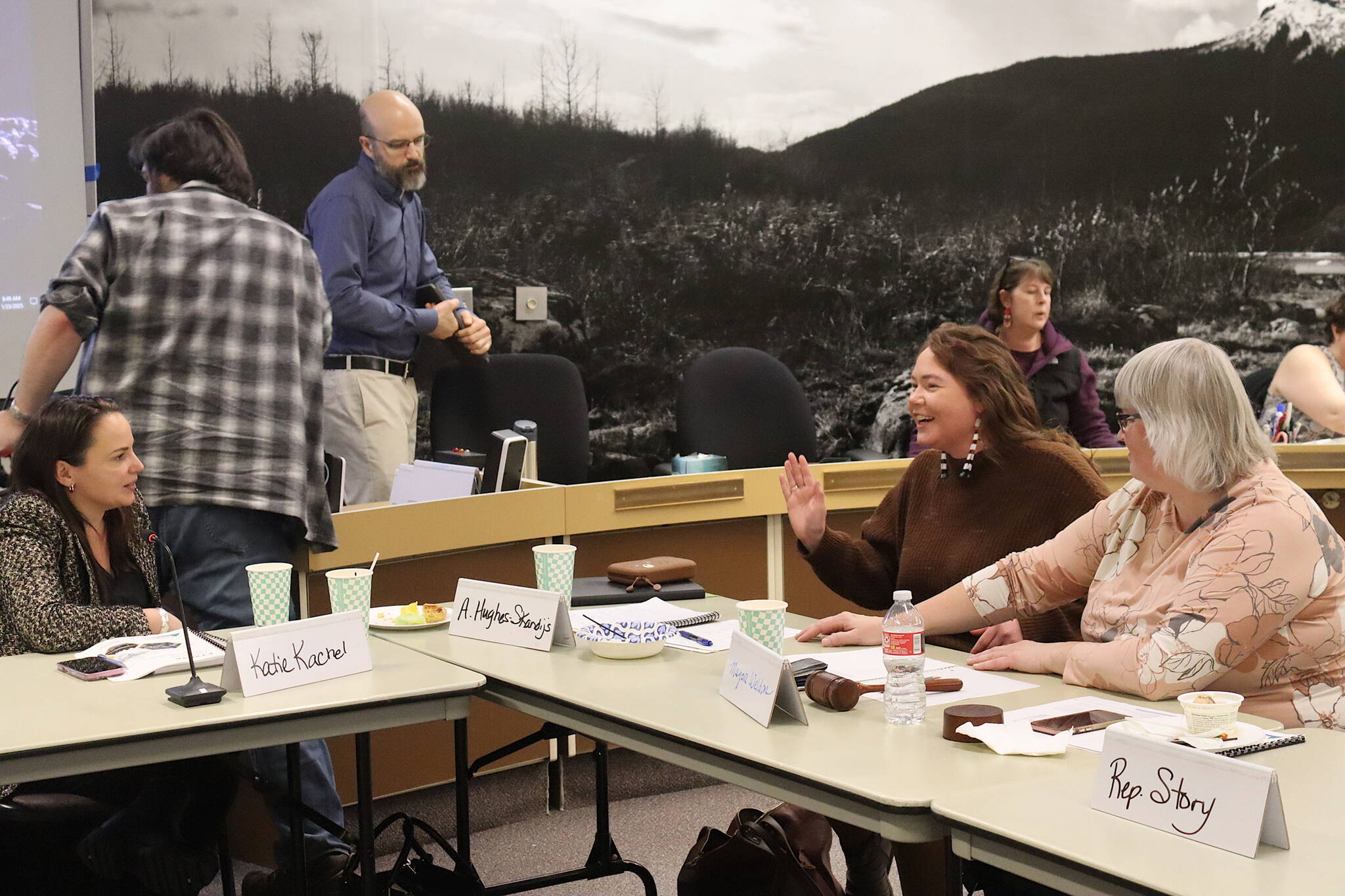Federal government involvement in Juneau’s glacial flooding problem isn’t expected to change significantly with Donald Trump back in the White House, although officials working on behalf of the city said they’re omitting references to climate change causing such floods.
“The focus is it flooded two years in a row on the same day,” Katie Kachel, a lobbyist hired by the City and Borough of Juneau for federal issues, said Thursday. “We’re not asking for why. We’re just saying that we expect it will.”
Other local impacts of the new presidential administration largely remain to be seen, but so far mostly appear as if they will affect “green” issues such as a loss of electric vehicle support, Kachel said during a joint meeting of the Assembly and Juneau’s state legislative delegation on Thursday. Some of the initial work involves determining specifics of a record number of day-one executive orders Trump signed on the first day of his second term Monday that include vast policy changes both in Alaska and nationwide.
“There’s a lot going on in the D.C. front with these executive orders,” Kachel said. “Right now we’re trying to spread out what they mean. I think the top line is they are raising a lot of questions.”
The federal government is playing a vital role in Juneau’s efforts to seek short- and long-term remedies for record glacial outburst floods from Suicide Basin that have damaged hundreds of Mendenhall Valley homes, with experts stating there is a high chance of such flooding annually now due to climate change.
The U.S. Army Corps of Engineers, for instance, is providing large HESCO barriers for a semipermanent levee along a portion of the Mendenhall River if the city agrees to pay for installation. The Corps would also play a central role in assessing and implementing a long-term solution that could take a decade to implement and cost $100 million or more, according to preliminary city estimates.
Trump, meanwhile, has stated he will halt federal climate action policies and one of his first-day executive orders directs the U.S. to withdraw from the 2017 Paris climate agreement. On Friday, the president said he will sign an executive order “fundamentally reforming…or maybe getting rid” of the Federal Emergency Management Agency (FEMA), stating he would prefer states to get direct payouts. The agency as of November had OK’d more than $2.6M for Juneau flood victims.
Other federal government actions under the Trump administration that may be particularly relevant to Juneau are those in the Inflation Reduction Act of 2022 that included $437 billion for clean energy projects, climate change mitigation and extending Affordable Care Act subsidies. One of Trump’s executive orders seeks to halt spending related to the inflation act, which as of early 2024 had provided $7.2 billion to Alaska for projects such as water and wastewater infrastructure, heat pumps for households, and broadband access for rural areas.
“They’re going to be taking a look at how that money has gone out and making sure that it’s meeting the new administration’s priorities,” Kachel said. “And the devil will be in the details of that too because we have some grants that have signed agreements between the project sponsor and the federal government, and those are contracts, right? How can they be undone?”
She said an example of a specific cut is the Charging and Fueling Infrastructure Grant Program, which provides publicly accessible electric vehicle charging infrastructure. Alaska was scheduled to receive more than $50 million between 2022-2026 for the program, with Alaska Business reporting Jan. 17 (three days before Trump’s inauguration) $11 million had been secured for fiscal 2025 to continue expanding charging infrastructure, with efforts so far largely focusing on a Alternative Fuel Corridor between Anchorage and Fairbanks.
“There could be ramifications in lots of different ways. But the one way I see this ending up is grant funding notices of opportunity going forward will not emphasize electric vehicles and things like that. We have plenty of other projects that we can be focusing on so I don’t think that is a huge loss to us. We’ll just make sure that we’re reading those carefully and we are aligning our priorities with their priorities because that’s how you get the money.”
Thursday’s meeting also focused on the state legislative session that started Tuesday, with the three members of Juneau’s all-Democratic delegation reiterating assessments that simply maintaining status quo levels of spending will be a challenge this year due to oil prices that so far are lower than expected this year and expected to remain in that range during the coming year.
The Assembly presented its list of state funding requests for capital improvement projects to the delegation. The top priority is at least $30 million for glacial flood mitigation related to “public safety, disaster preparedness (and) affordable housing” — with the language of the request appearing suitable for federal submission when the time to seek those funds comes.
“The Mendenhall Valley has experienced multiple years of record glacial lake outburst floods (GLOF) from Suicide Basin,” the city’s request states. “The August 2024 event released 16 billion gallons of water over a short period of time causing widespread flooding, evacuations and damage to 290 homes. Scientists indicate that full basin releases, and continued catastrophic flooding, are likely. CBJ is considering all available short and long-term solutions to mitigate the potential widespread damage from future releases. While more information is required to determine estimated costs of the selected solutions, the funding need will be significant and ongoing.”
• Contact Mark Sabbatini at mark.sabbatini@juneauempire.com or (907) 957-2306.

